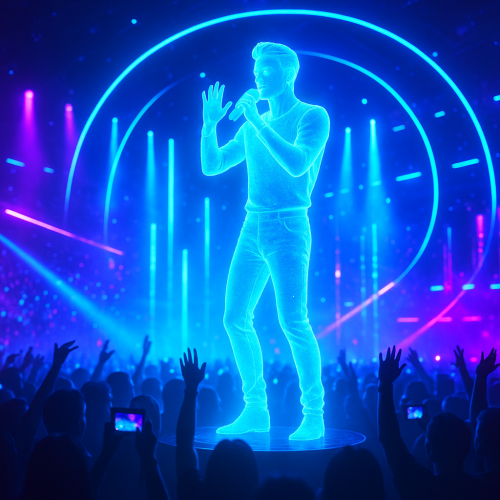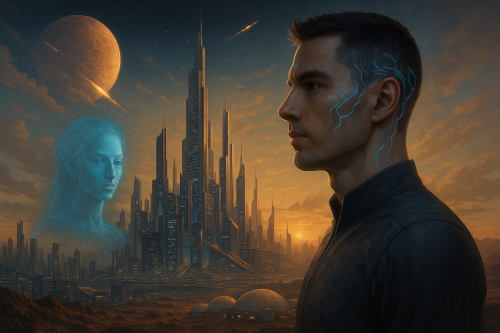Hollywood writers went on strike over pay this week, but the decision by companies like Netflix and Disney to use artificial intelligence to replace human writers in the future only fuels anger and fear among the protesters.
AI programs such as ChatGPT, which have an increasing ability to amazingly mimic human conversation, are raising concerns across many industries. As such, the White House called a meeting with Big Tech this week to discuss potential threats. As part of weekly talks with studios and streaming platforms that ended Monday, the Writers Guild of America has asked for binding contracts to govern the use of artificial intelligence. According to the proposal, nothing written by AI can be considered "literary" or "source" material - industry terms that govern who receives royalties - and scripts written by WGA members cannot be "used to train AI." However, according to the WGA, the studios "rejected our proposal" and responded with a proposal to meet once a year to "discuss advances in technology".
The writers' strike is gaining momentum after the statements of streaming platforms that writers in the future may be replaced by artificial intelligence. Netflix and Disney have confirmed that they allow the use of algorithms.
"It's nice that they're offering a meeting about how they're using this against us!" joked WGA negotiating committee member Eric Heisserer, who wrote the script for Netflix's Bird Box. “Art cannot be made by a machine. You are losing the heart and soul of history... I mean the first word is 'artificial', he told AFP during a picket outside the streaming giant's headquarters. While writers already know this, the danger is that "we have to watch tech companies destroy business trying to find out," he said.
While few of the television and film writers who spoke to AFP believe their work could be replaced by computers, for many it was an added blow that studios and streaming platforms believe in the possibility of such a replacement. Screenwriters fear that Hollywood executives, where Silicon Valley companies have overturned many traditional practices such as long-term contracts for screenwriters, may try to cut costs even further by forcing computers to write more blockbusters. The statements of Hollywood's top executives at the Milken Institute Global Conference in Beverly Hills did not dispel the writers' fears in any way. "In the next three years, you're going to see a movie that's been written by AI and shot…good," said film producer Todd Lieberman. “Not just scripts. Editing, everything… scriptwriting, whatever,” added Fox Entertainment CEO Rob Wade. "AI in the future, maybe not next year or next year, but if we're talking about 10 years? Artificial intelligence will be able to do absolutely all of these things.”
Even for sci-fi writer Ben Ripley, who believes AI plays no role in writing, the introduction of legislation "to put up barriers" is "very necessary". Writers "have to be original," he said. "Artificial intelligence is the antithesis of originality."
#netflix #disney #ai #artificialintelligence #movies #film #technology
The system developed at the University of Texas in Austin (USA) - an artificial intelligence connected to an MRI scanner read the thoughts of volunteers. For now, it still makes mistakes, but in the future, similar devices could help people who are unable to communicate normally.
During the experiment, volunteers listened to a story or imagined telling it. Their brains were observed with the help of magnetic resonance imaging (MRI), and the artificial intelligence connected to it turned people's thoughts into text consistent with them. Importantly, no electrodes were needed to be implanted in the brain, and the person using the invention was not limited to a predetermined list of words, the researchers emphasize. However, the system requires special training - each person using it listens to podcasts for several hours, during which the computer watches his brain. "For non-invasive methods, this is a real leap forward compared to what was previously achieved, i.e. usually reading single words or short sentences" - says Prof. Alex Huth, author of the paper, which appeared in the journal "Nature Neuroscience". "Our model decodes long-term, continuous speech on complex topics," he emphasizes.
For now, the computer is not very accurate - it reads thoughts quite precisely in about 50 percent. However, he can often convey the meaning of the utterance. For example, he translated the thought, "I don't have a driving license yet," into "she hasn't started learning to drive yet." Listening to the thought, "I didn't know whether to scream, cry, or run away," he read as "She started screaming and crying and then she said 'I told you to leave me." The system was also good at reading the minds of the volunteers when they watched the videos. The creators of the program also addressed the topic of its possible abuses. They assure that at least currently it is impossible to read someone's mind if the person does not want to. It is also impossible to do it with someone with whom the system has not undergone a long training. “We take concerns about abuse very seriously and are working to prevent them. We want to make sure that people use these technologies when they want to, and that it helps them," said Jerry Tang, who led the research. Scientists hope that their idea will allow for the construction of devices that will allow people currently unable to communicate with the world, e.g. after severe strokes. The current version of the system only allows for its use in the laboratory, but according to the researchers, this can be changed - for example, instead of a large MRI scanner, it is likely that a much smaller device designed for non-invasive functional near-infrared spectroscopy can also be used.
#austin #usa #ai #artificialintelligence #technology #tech #future #science
In recent years, Artificial Intelligence (AI) has played a significant role in the development of various industries, including the music industry. With the emergence of AI music, it has impacted the streaming platforms in several ways. This article explores the impact of AI music on streaming platforms.
Firstly, AI music has revolutionized the way music is created and produced. AI music is produced using algorithms and machine learning, which analyze data and create music based on the patterns and preferences of listeners. This means that AI music can be customized to fit the tastes of individual listeners, which can attract more subscribers to streaming platforms.
Secondly, AI music has improved the quality of music streaming platforms. For instance, AI algorithms can be used to enhance the sound quality of music tracks by removing background noise or compressing audio files without affecting the quality. This ensures that listeners have access to high-quality music, which can increase user engagement and reduce churn rates.
Thirdly, AI music has enabled streaming platforms to personalize their services to individual users. By analyzing the music preferences of users, AI algorithms can recommend music tracks and playlists that are tailored to the individual's preferences. This personalization enhances the user experience and can attract more users to the platform.
Fourthly, AI music has improved the discovery of new music. Streaming platforms can use AI algorithms to analyze the listening habits of users and recommend new music that fits their preferences. This feature can increase the user's engagement with the platform and can lead to increased revenue from subscriptions and advertisements.
Fifthly, AI music has enabled the creation of new revenue streams for streaming platforms. With the use of AI algorithms, streaming platforms can create new music tracks and playlists, which they can monetize by selling them to users or licensing them to other platforms. This can create additional revenue streams for streaming platforms and can help them to become more profitable.
In conclusion, AI music has had a significant impact on streaming platforms. It has improved the quality of music, enhanced the user experience, and created new revenue streams. As AI technology continues to develop, it is expected that AI music will play an increasingly important role in the music industry and streaming platforms.
#music #AI #artificialintelligence #spotify #streamingplatform #alghoritms #tidal
Up until now, there has been numerous changes to the design industry, websites such as Fiverr made the design industry, and a lot of industries for that matter, more competitive, and artificial intelligence is going to be yet another innovation to challenge and alter the landscape of graphic design in a variety of ways. Designers will be able to produce designs that are even more impressive and make more of an impact due to AIs increasing complexity. In the future, designers will train their AI tools to solve design problems, creating patterns according to their preferences.
You may be able to learn to use these tools in the course of your graphic design education. With constant advances in artificial intelligence technologies, graphic designers will have the ability to build the structure of designs which are hard to build for an individual person. Automated design tools are able to produce complete designs by themselves, without involving the human designer at any stage in the process.
The Dubai-based inspiration behind this piece came from experiencing these questions about graphic design automation on a personal level; trying to automate and optimise their processes, while trying to find a suitable tool that would not hamper their creative work. Adobe is aware of the threats ML and AI poses to the jobs of graphic designers, so their journey to building AI tools is about building ones that allow humans to do their jobs better.
While AI is highly capable in cutting down on graphic designers footwork, AI cannot substitute the job that requires human intuition and emotion. One of the main benefits of using AI for graphic design is that it can decrease their workloads by performing repetitive tasks, saving their time for more complex visuals. It will be used to produce designs more quickly, without sacrificing quality or creativity (if done right).
Designers working with AI will be able to produce designs more quickly and cheaply because of the increased speed and efficiency that it offers. The appealing parts of AIs ability to automate tasks makes AI tools worthwhile for the design industry. AI helps designers use the data generated to best utilize their creative minds.
The power of AI will be the speed at which it is capable of analysing massive amounts of data and suggesting adjustments to designs. For most graphic designers not working on simplified, limited-scope projects, there is no need to worry about AI automated graphics design, or any other creative field; it will just augment it in the near future. There is growing evidence that Artificial Intelligence (AI) will play an important role in the future of graphic design.
#AI #intelligent #task #graphic #future #art #artificialintelligence #assist










